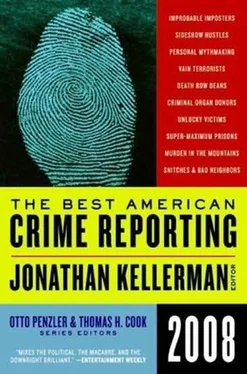With foreign mountaineers and guides like Luis Benitez, Cho Oyu is an international crossroads because of the Nangpa La Pass, not far from where advanced base camp is established most years. Because it is remote, hard terrain, Nangpa La Pass is a difficult part of the border for the Chinese to patrol, and thus it’s one of the few places where Tibetans looking to leave their occupied homeland undetected risk the elements for freedom abroad. In 1959 the Dalai Lama used a route like this one to escape into exile; Xinhua, the government-run Chinese news service, has dubbed it a “golden route” for Tibetans seeking asylum from Chinese rule.
It’s also a trade route; some of the traders using the Nangpa La Pass had stopped in camp to sell their wares, including knockoff name-brand parkas from Beijing. But the people the Chinese were shooting at now didn’t look like traders, and they weren’t. Many were nuns and monks, unable to practice their faith freely in Tibet. While a few Tibetans are able to obtain passports to travel abroad, fleeing refugees violate Article 322 of the Chinese criminal code, are jailed immediately, and, according to Human Rights Watch, are often tortured and then monitored by authorities for years after.
As the shooting erupted around him that morning, Benitez says he contemplated a “Rambo move” to try to disrupt the Chinese soldiers. Only Benitez is no commando; he’s a sunny, sincere mountain guide. To his self-confessed shame, Benitez did nothing to stop the soldiers as they used the Tibetans for target practice.
On the one hand, this most recent Himalayan disaster had a familiar ring to it, as the mountaineers had to choose between their own selfish goals and helping others in distress. Several of the climbers, including Benitez, continued up toward the summit after the Chinese soldiers stormed their camp, rounding up refugees.
But in most other respects this incident stood alone: A cold-blooded murder by the host nation’s own police left foreign witnesses not knowing at all what to do. Confusing matters further, a handful of commercial outfitters and their guides allegedly told climbers not to tell anyone outside of camp about the shooting. Fearful the Chinese authorities would revoke their permits to operate on Cho Oyu and the Chinese/Tibetan side of Everest, or that they’d seek revenge on the Tibetan cooks and porters in their employ, two of the top Everest guide operations allegedly suppressed news of the shooting.
The incident made headlines, especially in Europe, when it reached the media in October 2006, but drawing on more than 30 interviews, transcripts of interviews conducted by the Washington, DC-based International Campaign for Tibet (ICT), and visits to Cho Oyu and India, this is one of the most complete accounts yet compiled. Before the climbers spoke out, and Sergiu Matei aired his video, the Chinese claimed the shooting was in self-defense. Meanwhile, climbers were left to contemplate what it meant for their sport that peers would put personal and commercial goals ahead of reporting an atrocity. The episode could play as farce if it hadn’t cost at least one young woman her life and if it hadn’t exposed, on the eve of the Beijing Olympics, the brutal contempt the Chinese authorities continue to have for Tibetans.
LIKE MANY OF THE ESTIMATED 2,500 to 3,500 Tibetans who flee their occupied homeland each year, Kelsang Namtso wanted the freedom to practice Tibetan Buddhism. A serious young woman who dressed in the traditional long skirts of a Tibetan nomad, Kelsang, 17, and her best friend Dolma, 16, rosy-cheeked and more jovial than her friend, left Nagchu, their home in a rural area northeast of Tibet’s capital, Lhasa, with the intention of seeking out the Dalai Lama, their leader in exile, in Dharamsala, India.
Kelsang and her five brothers grew up with parents who struggled to make ends meet as semi-nomads, Dolma told me. Forced to recite paeans to Mao Tsetung, Kelsang dreamed of becoming a nun. (In Tibet it’s an honor for one child from every family to follow a Buddhist calling; it accrues “merit” for the whole family.) But Kelsang’s parents were against it. Her mother had arthritis and felt that her only daughter should be at home helping her. “Her mother didn’t want her to be a nun because she was the only girl,” says Dolma. “She said she had to help her mother.”
Undaunted, Kelsang took vows with lamas in secret, stopped listening to music and dancing, which she loved, and maintained a strict vegetarian diet. Eventually, she left under the cover of night for a free life, on September 18, 2006.
After dodging Chinese army patrols in Lhasa, Kelsang and Dolma were crammed into the back of a truck with 75 other refugees numbering monks, nuns, and children as young as seven. Dolma. Kelsang, and the others had paid around $500 each-two years of wages for rural Tibetans-to two men, illegal guides, who were secretly stowing everyone in the truck. Even before they left, one man’s courage deserted him. He jumped off the truck and fled home. As they lurched on into the night, another started vomiting with fear.
As the vehicle rumbled out of Lhasa, sliding past Chinese checkpoints, the mood inside was desperate. Inside the juddering, dark, and airless interior, children began to cry, cries that risked everyone by alerting Chinese border guards. The guides urged them to be silent with hoarse whispers. Guides face up to 10 years in prison for leading refugees out of Tibet.
The guides pushed hard, getting angry if anyone faltered. Temperatures dropped to well below freezing. Dolma and Kelsang walked with the hems of their skirts sodden and caked with snow, their arms folded across their chests to keep their fingers warm as they stumbled and fell. They had left with a store of tsampa , roasted barley flour, to sustain them, but their supply ran out; worse, they found themselves without water. At one point they came across herders, who charged them 70 yuan (about $9) for plastic bags of water.
Kelsang, with Dolma at her side, was faring badly. The altitude and lack of food gave her splitting headaches. Finally, 12 days after leaving Lhasa, a monk in the group spotted orange and yellow climbers’ tents, incongruous against the dazzling white.
Figures clad in long coats clambered down the rocks toward them. The monk thought they might’ve been Tibetan monks in religious dress and waved. The refugees embraced one another as relief swept through the group. Then they realized the long coats were actually fur-lined Chinese army-issue, known as dayi. The smiles froze on the refugees’ faces. Some in the group shouted warnings, “They are soldiers!” and urged everyone to run.
Pandemonium erupted. A soldier started screaming, “ Thama de! ” which translates as “Fuck your mother.” Puffs of snow erupted around them as bullets tore into the ice.
“I heard the bullets zinging past my ears,” says Dolma. “The noise was like, tag, tag. And then when they came past my ears, they were like, pew, pew. ”
Refugees split off running in different directions, which at that altitude is a superhuman feat. A few escaped. Somewhere in the melee Dolma lost Kelsang. Her back to the soldiers, woozy from the altitude, Kelsang presented a slow-moving target. She was a few yards from cresting a ridge and getting out of range when a 7.62mm round tore into her back, just under her left arm. She slumped in the snow and, 20 minutes from freedom, died.
BACK IN CAMP SERGIU MATEI, the Romanian climber, switched off his camera. “I didn’t want to film her dying,” he said. He had nearly 30 minutes of film that would have a devastating worldwide impact-if he could get it out of the country. Immediately Matei felt a lingering gaze from a soldier nearby. He waved to the soldier and swallowed hard, trying not to betray his fear before walking back to his tent to stow the tape.
Читать дальше












